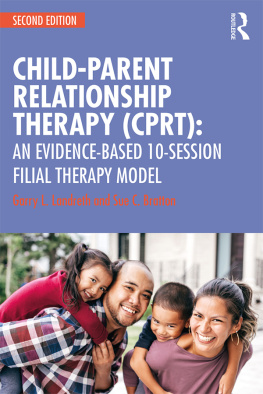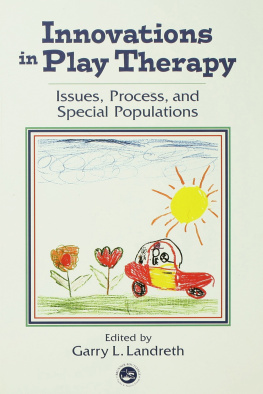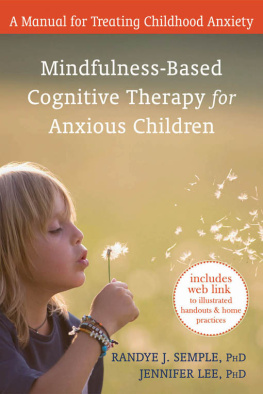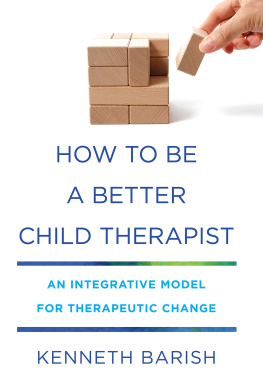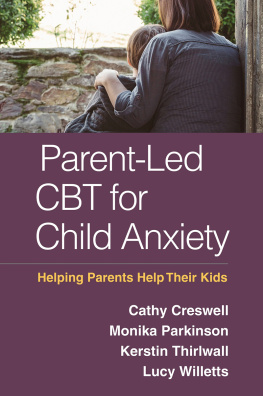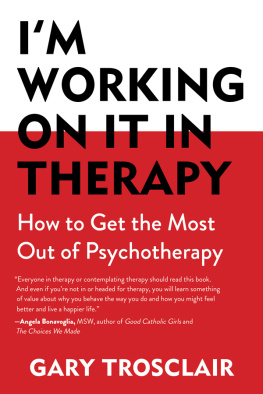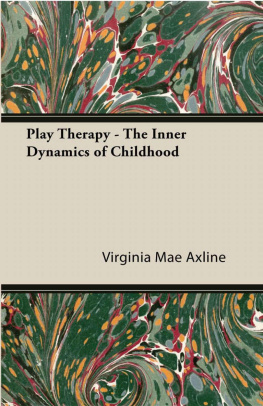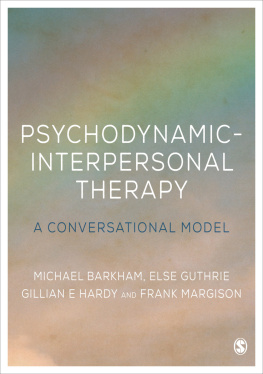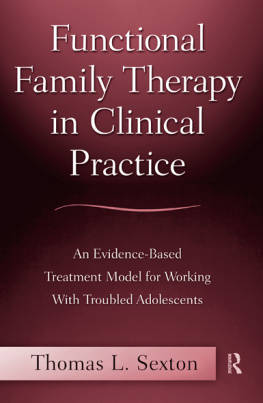This is a true second edition, with six new chapters! The applications for working with toddlers and tweens are specific, detailed, and wonderful. The discussion of how neuroscience aligns with CPRT is insightful. An exploration of CPRT research, along with the evidence-based designation, adds informative value. Other additions for using CPRT with adoptive families, teachers, and discussion of cultural issues round out the core chapters for the 10-session model! It is a treat to read and experience!
Linda E. Homeyer, PhD, LPC-S, RPT-S,
distinguished professor emerita at Texas State University and director emerita at the Association for Play Therapy
In their new edition, Landreth and Bratton build on their ground-breaking original CPRT treatment approach to provide an updated and expanded model that is practical, evidence-based, and applied to parents of toddlers through preadolescents as well as adoptive families and other systemic partners. Additionally, the authors have integrated interpersonal neurobiology and recent treatment research to provide rationale that makes a difference for child-parent relationships.
Dee C. Ray, PhD, LPC-S, NCC, RPT-S,
distinguished teaching professor and director of the Center for Play Therapy, University of North Texas
CPRT has been empirically demonstrated to improve child-parent relationships and child behaviors. This protocol for therapists provides the essentials needed to implement the program successfully. The notebook for parents expands on the principles, allowing parents to apply them to home situations. These resources enable users to experience the full value of CPRT.
Louise Guerney, PhD, RPT-S,
professor emerita at Penn State University, co-developer of Filial Therapy, and faculty member of the National Institute of Relationship Enhancement (NIRE)
Child-Parent Relationship Therapy (CPRT)
Child-Parent Relationship Therapy (CPRT), grounded in the attitudes and principles of Child-Centered Play Therapy (CCPT), is based on the belief that a parent acting as an agent for change in place of a play therapist has potential for significant and lasting therapeutic gains. This newly expanded and revised edition of Child-Parent Relationship Therapy (CPRT) describes training objectives, essential skills and concepts taught in each session, as well as the format for supervising parents play sessions. Transcripts of actual sessions demonstrate process and content in the 10 CPRT training sessions. Research demonstrating the effectiveness of CPRT on child and parent outcomes is presented in support of CPRTs designation as an evidence-based treatment model.
This second edition is updated to include six new chapters exploring the topics of cultural considerations for working with ethnically and racially diverse families, neuroscience support for CPRT, and adaptions for specific populations including parents of toddlers, parents of preadolescents, adoptive families, and the teacher/student relationship. The authors expertise and experience results in a book that is essential reading for both students and professionals. By using this text and the accompanying treatment manual, filial therapists will have a complete package for training parents in the CPRT model.
Garry L. Landreth, EdD, LPC, RPT-S, is regents professor emeritus, department of counseling and higher education, and founder and director emeritus, Center for Play Therapy at the University of North Texas.
Sue C. Bratton, PhD, LPC-S, RPT-S, is professor emerita, department of counseling and higher education, and director emerita, Center for Play Therapy at the University of North Texas.
Child-Parent Relationship Therapy (CPRT)
An Evidence-Based 10-Session Filial Therapy Model
2nd Edition
Garry L. Landreth and Sue C. Bratton

Second edition published 2020
by Routledge
52 Vanderbilt Avenue, New York, NY 10017
and by Routledge
2 Park Square, Milton Park, Abingdon, Oxon, OX14 4RN
Routledge is an imprint of the Taylor & Francis Group, an informa business
2020 Taylor & Francis
The right of Garry L. Landreth and Sue C. Bratton to be identified as authors of this work has been asserted by them in accordance with sections 77 and 78 of the Copyright, Designs and Patents Act 1988.
All rights reserved. No part of this book may be reprinted or reproduced or utilised in any form or by any electronic, mechanical, or other means, now known or hereafter invented, including photocopying and recording, or in any information storage or retrieval system, without permission in writing from the publishers.
Trademark notice: Product or corporate names may be trademarks or registered trademarks, and are used only for identification and explanation without intent to infringe.
First edition published by Routledge 2006
Library of Congress Cataloging-in-Publication Data
A catalog record for this book has been requested
ISBN: 978-1-138-68902-2 (hbk)
ISBN: 978-1-138-68903-9 (pbk)
ISBN: 978-1-315-53794-8 (ebk)
Typeset in ITC Garamond Std Light
by Apex CoVantage, LLC
Contents
R aissa M. M iller
M ary M orrison B ennett and K ara C arnes -H olt
P eggy L. C eballos , K ristin M eany -W alen , and K ara C arnes -H olt
K ara C arnes -H olt and K ristie K. O piola
M ary M orrison B ennett and W endy P retz H elker
A ngela I. S heely -M oore , P eggy L. C eballos , Y ung -W ei D ennis L in, and Y umiko O gawa
S ue B ratton and A lyssa M. S wan
This book is about changing the mental health structure of families, communities, and ultimately society, by changing the nature of relationships in families through a process of helping parents become therapeutic agents in their childrens lives. From ongoing research, we now know that in a matter of a few weeks, parents are quite capable of learning and incorporating into their relationships with their children and spouses therapeutic skills once thought to require years of graduate education and training.
What we have written in this book about Child-Parent Relationship Therapy (CPRT): An Evidence-Based 10-Session Filial Therapy Model is an extension of our experiences with children in play therapy as they expressed themselves through the process of play in the safety of a caring relationship that released their inner dynamic potential that had been previously unknown to significant adults in their lives. We have long held a deep and abiding belief in the ability of parents to establish the same kind of therapeutic relationship with their own children by learning and incorporating the basic attitudes and skills of Child-Centered Play Therapy in special play relationships, referred to as filial therapy.
We believe the mental health of future adult populations lies squarely on the shoulders of mental health procedures that empower parents to become therapeutic agents with their own children. We must not wait until children become adults to attempt to impact their mental health, for by then a lifetime of less than the best has been lived out. That is not a very progressive or satisfying way for a society to go about the experience of living life. Mental health professionals must actively engage in the process of giving their skills away to familiesthat is the future.
We are indebted to the many parents who have shared their lives with us in our CPRT groups. From those parents, we have learned how to be more facilitative in our roles as filial therapists and how to use ourselves more fully in developing relationships with parents in our CPRT training groups. From parents, we have learned what works and what does not work very well in the training process. In general, parents have helped to perfect the 10-session filial therapy model into a dynamic, therapeutic, and educational process that changes lives.

